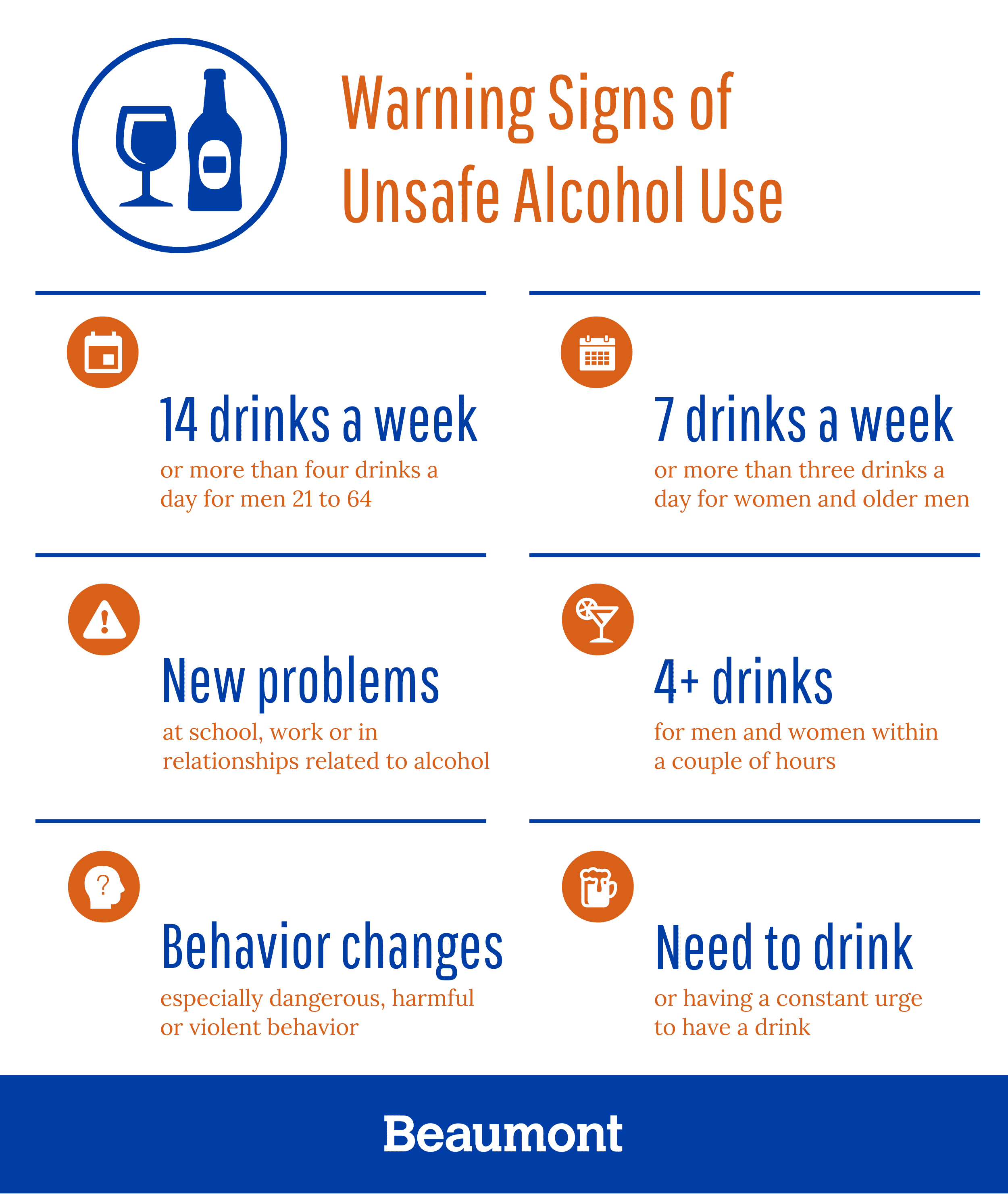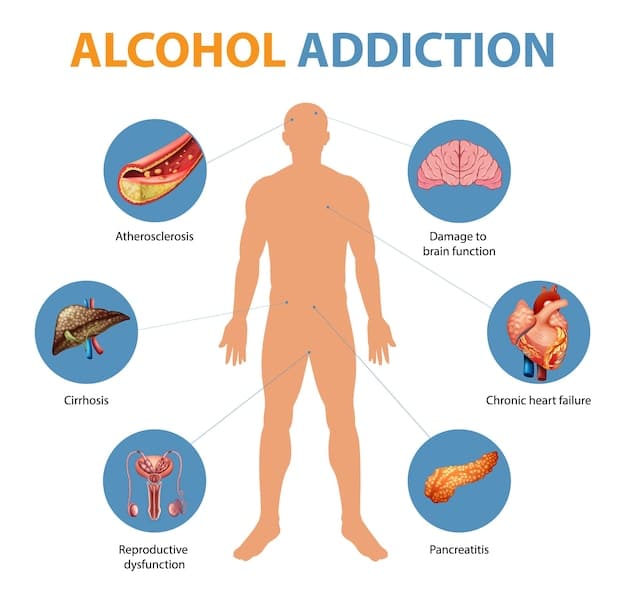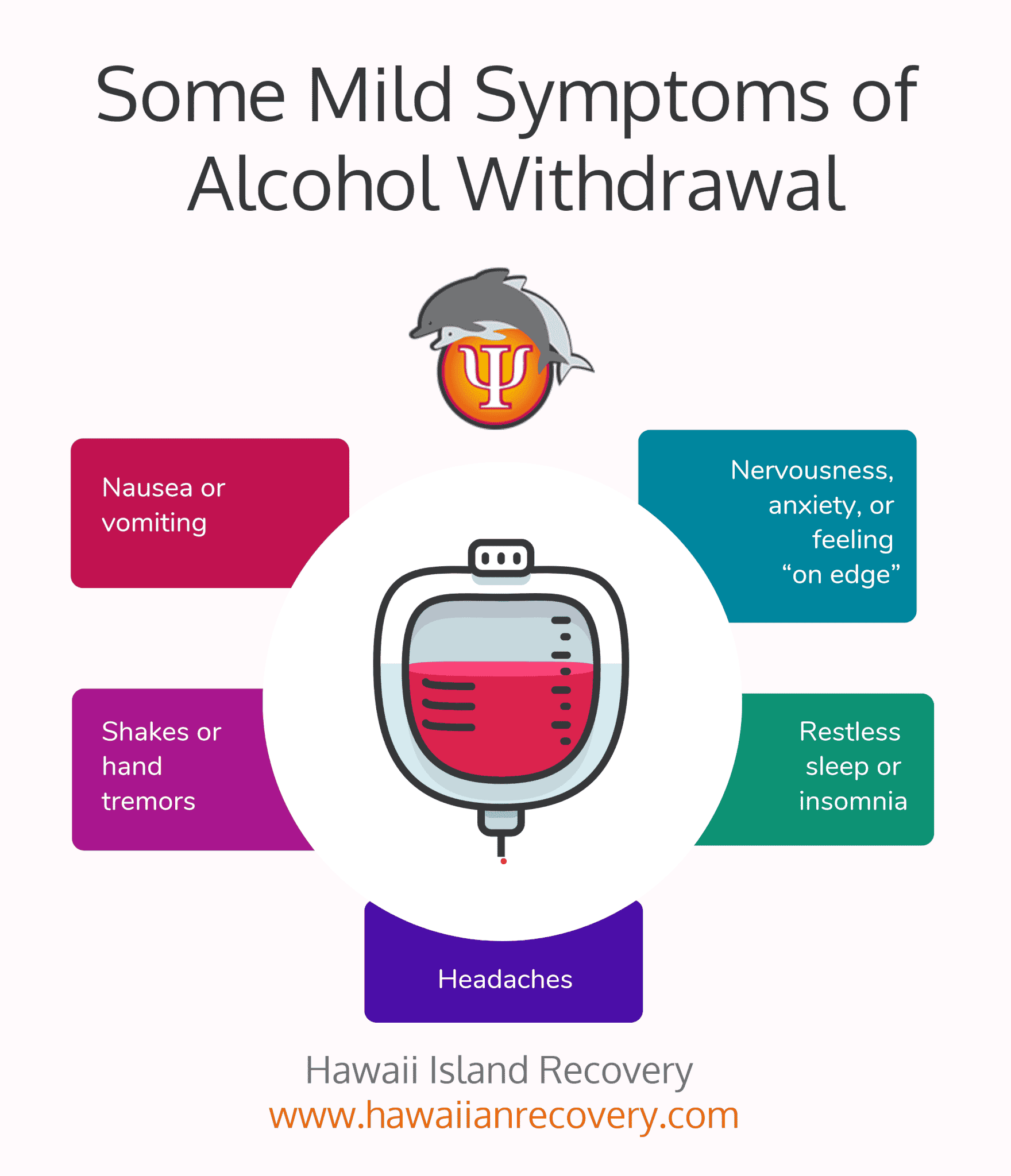Negative Impacts On Daily Life
The overuse of alcohol can have negative impacts on an addicts everyday life. They might find themselves performing poorly at work or school, their parenting skills are not the same, or they are neglecting their relationships, etc.
This is normally a result of a hangover in the beginning stages of a drinking problem. Eventually, users will start to use alcohol to get over these hangovers and will find themselves drinking in the morning, at work, or place of study. They might need to have a glass of something before the kids come home from school, or they could get into violent fights with their loved ones after consuming too much.
When alcohol starts having noticeable negative impacts on daily life, it is a sure sign of alcoholism.
Physical And Psychological Symptoms Of Alcohol Misuse & Dependence
Alcohol has immediate effects, as the American public clearly knows. The immediate impact of alcohol use on the body includes but is not limited to:
- Slowed reaction times
- Trouble with motor coordination or an inability to walk properly
- Impaired judgment and risk-taking without full consideration of the consequences
- Memory impairment or memory lapses
An alcohol use disorder, especially at the more severe end of the spectrum, can lead to permanent and debilitating health conditions that may require care for a lifetime. Some of the most acute problems relate to the indirect problems that an alcohol use disorder causes.
A tipoff that a persons behavior has progressed to an alcohol use disorder concerns their nutritional habits. As alcohol misuse takes firmer root, people often neglect their nutritional health. The person may show signs of malnutrition, such as a gaunt appearance, hair loss or thinning, and dark circles under the eyes. These may be symptoms of a general condition known as thiamine deficiency. The brain and all the tissue in the body need thiamine for healthy functioning. Individuals with an alcohol use disorder may be suffering from a thiamine deficiency, among other nutritional deficits.
If you believe you or someone you love is starting to show signs of alcohol misuse and need help or are unsure as to whether you can financially afford rehab, use our insurance verification tool below to see if all or part of the cost may be covered by your insurance provider.
Behavioral Signs Of Alcohol Addiction
- Misses important dates or arrives at important functions intoxicated.
- Instances of domestic abuse, aggression, assault, and DUI.
- Inappropriate and impulsive behavior.
- Cannot take criticism or advice especially related to alcohol use.
- Is isolated or withdrawn.
- No longer participates in former hobbies and interests.
- Acting uncharacteristically or recklessly.
Read Also: How To Lose Weight When Addicted To Food
Lots Of Time Spent On Alcohol
Alcoholics spend a great deal of time engaged in alcohol-related activities. They also may neglect nearly everything else that matters to them. Family commitments, job requirements, financial obligations, hobbies, home and property care all of these activities go by the wayside. An alcoholic will often defend his or her actions by saying they need to unwind or that no one understands their problems.
How To Treat Alcoholism

Alcoholism can be treated in many ways it depends on the specific case. Treatment options for alcoholism vary depending on the person.
- Medication-Assisted Detox : Medications like benzodiazepines are used to prevent seizures and serious complications during withdrawal.
- Inpatient Care: Staying at a residential treatment center for a prolonged period typically monitored by licensed mental health professionals.
- Outpatient Care: Meetings with addiction treatment professionals on a weekly basis can also turn into aftercare meetings and AA settings.
- Sober Living Homes: These are homes where people live in groups to recover. These homes use responsibility and a safe environment to reduce triggers of relapse.
These are the most common types of alcohol addiction treatment but some people can also recover on their own if the case isnt severe.
You May Like: How To Get Over Nasal Spray Addiction
Alcohol Abuse Symptoms: 5 Signs You May Have A Problem
While a glass of wine with dinner or a beer after work may not seem like a big deal, you need to be cognizant of your drinking habits to make sure they don’t transition into alcohol abuse.
One “drink” or serving of alcohol is defined as: 12 ounces of beer, five ounces of wine, or 1.5 ounces of liquor. Knowing your drinking habits â amount and frequency â can help you or someone you know understand whether or not they are abusing alcohol.
Here are five signs you may have a drinking problem.
Having A Drink When Under A High Amount Of Stress
It is true that alcohol can help people relax a bit and get rid of stress, but only if it is consumed in very small quantities. If someone abuses this substance, it will only aggravate the problem, not make ones life easier. Alcoholics develop the bad habit of drinking when stressed or have to face a difficult situation. Even worse, alcoholics dont stop at a drink or two but continue to drink until a blackout occurs. Among alcoholic behavior patterns, drinking under stress is one of the most common. These people do so to try to feel relaxed or forget about problems, but this never happens.
Also Check: How Much Nicotine Does It Take To Get Addicted
Signs Of Alcoholism & Symptoms Of Alcohol Withdrawal
Alcoholism is the physical or mental dependence on alcohol. If you find yourself regularly thinking about your next drink, or if youve tried to cut back on drinking and never quite succeeded, you may have an alcohol addiction.
Alcoholism begins with dependence. Alcohol is a drug, and as you drink more, the body adjusts to its effects and learns to compensate. Eventually, as dependence develops, stopping alcohol can lead to withdrawal symptoms.
- Not thinking clearly
It may take a few hours or days for these symptoms to show, and they may get worse in the days following.
In some cases, the individual may experience delirium tremens the most severe form of alcohol withdrawal. This can cause agitation, fever, hallucinations, confusion and seizures. For this reason, people who drink heavily and are looking to end their addiction should seek medical assistance.
Early Signs Of Alcoholism
There are various warning signs to help detect potential alcohol abuse. While many early signs of alcoholism are recognizable, others may be more challenging to identify. Also, the severity of alcoholism may play a role in the warning signs a person displays. For instance, some people try to cover their alcohol abuse by drinking in private and isolating themselves from others. This makes it difficult for family members or friends to intervene and help their loved ones.
Because alcohol is both legal and socially acceptable, theres a common misconception that it doesnt pose as big a threat as other illegal drugs. The fact of the matter is that alcohol addiction is extremely dangerous and even fatal . Mild alcohol abuse can be easily overlooked. However, what may appear as a minor problem can turn destructive over time. These early signs of alcoholism should not be ignored. Seeking alcoholism treatment sooner rather than later will allow you to get back to the things you enjoy most in life.
If someone you know has an alcohol problem, the most important thing is getting immediate help. But how do you know if theres actually a problem? To help you out, were breaking down ten early signs of alcoholism.
Although there are many early signs of alcoholism, some can be hard to recognize. No matter how minor a drinking problem may seem, alcohol abuse signs should not be ignored. If you or a loved one is struggling with alcoholism, get professional help.
Don’t Miss: How To Help Someone Addicted To Adderall
Effects Of Alcohol Overdose And Withdrawal
Alcohol overdose, called alcohol poisoning, is a potentially deadly, very serious consequence of drinking large quantities of alcohol in a relatively short period of time. If you suspect that you or someone you love has alcohol poisoning this is a medical emergency. Call 911 immediately.
Signs and symptoms of alcohol poisoning include:
- Respiratory depression less than 8 breaths per minute
- Irregular breathing gap of greater than 10 seconds between breath
- Cyanosis of the lips and fingernails
- Pale, clammy skin
- Unconsciousness without the ability to be roused
People who have become chronic alcohol abusers may go through alcohol withdrawal syndrome if they suddenly cut back or stop drinking. This potentially-fatal condition should always be performed under the careful guidance of medical personal.
Signs and symptoms of alcohol withdrawal syndrome include:
- Tremors and shaking hands
- Alcohol hallucinosis Visual, auditory, or tactile hallucinations
Symptoms of Delirium Tremens :
- Disorientation, confusion, extreme anxiety
Co-Occurring Disorders
Early Signs Of An Alcohol Problem
Despite what movies and television shows portray, its not always easy to tell if someone has a problem with drinking. A person with AUD might not hang out in a bar all day or fall down after theyve been drinking heavily. Some people seem fine and functional in their daily lives despite their alcohol addiction.
One of the early signs is a pattern of excessive drinking. This pattern includes both binge drinking and heavy drinking. Binge drinking is when someone drinks a large amount at one time. For men, its drinking five or more drinks within two hours. For women, it is having four or more drinks within two hours. Heavy drinking is 8 or more drinks a week for women and 15 or more drinks a week for men. Drinking excessively from time to time does not mean someone has an alcohol addiction but it does put them at a higher risk for developing it.
Other early signs include getting intoxicated frequently, blacking out when drinking, becoming violent or angry when drinking, or drinking in risky or dangerous situations, like driving or having unprotected sex.
Also Check: Can You Get Addicted To Tramadol
Persistent Use Of Alcohol Despite Awareness Of Problems
Getting a DUI or receiving divorce papers may not be enough to make an alcoholic change their life. Alcoholics are often made aware of the problems caused by their drinking. They may feel powerless to change.
Other individuals may be so caught up in their denial that they dont understand the full impact of these consequences. Their downward spiral continues because they lose control and perspective. It may be increasingly difficult to face the problems caused by drinking, but it is possible to heal, no matter how severe the problems have been.
How Does It Make You Feel

The way alcohol affects you depends on many factors, including:
- your age, sex and body weight
- how sensitive you are to alcohol
- the type and amount of food in your stomach
- how much and how often you drink
- how long you’ve been drinking
- the environment you’re in
- how you expect the alcohol to make you feel
- whether you’ve taken any other drugs .
For many people, a single drink of alcohol releases tension and reduces inhibition, making them feel more at ease and outgoing. Some people feel happy or excited when they drink, while others become depressed or hostile. Suicide and violent crimes often involve alcohol.
Women are generally more sensitive to the effects of alcohol than men, and all adults become increasingly sensitive to alcohols effects as they age. When someone is more sensitive, it takes less alcohol to cause intoxication and more time for the body to eliminate the alcohol consumed.
Early signs of alcohol intoxication include:
- double or blurred vision.
A severely intoxicated person may black out, and have no memory of what was said or done while drinking. Effects of extreme intoxication include inability to stand, vomiting, stupor, coma and death.
Read Also: How To Fight Pornography Addiction
Needing More Alcohol For The Same Effect
A person that drinks heavily will have an increased alcohol tolerance over time. This means that they will need to consume more alcohol to reach the level that they want to be. This happens in small increments over time, but it could mean going from a couple of glasses to a couple of bottles of alcohol to get the same effect over a long period.
Signs Of Alcohol Abuse
Alcohol abuse is defined as any use that causes negative consequences to the user. Alcoholism symptoms can encompass health effects, such as bad hangovers and alcohol-induced accidents, as well as social effects, such as doing or saying regrettable things while intoxicated. Just because someone abuses alcohol does not mean they are dependent on or addicted to alcohol, but it is generally the first step towards the development of an issue later.
Binge drinking and alcohol abuse can start in the teenage years or even earlier, though adults and the elderly may pick up the habit too.
Alcoholism often begins in a persons early 20s and is characterized by frequent heavy drinking. This behavior leads to an increased tolerance to alcohol and eventually presents social and health problems. Recognizing when someone you care about is abusing alcohol can help you determine if they need help.
Some of the signs of alcohol intoxication include:
- Glassy or blank stares
Also Check: What Percentage Of Homeless Are Addicts
To Determine If You Should Refer Someone To A Mental Health Professional Look For These Signals:
- Signs of withdrawal after a short period of not using. Those signs can include shaking, nausea, anxiety, increased heart rate or blood pressure, sweating, runny nose or diarrhea.
- Lying about use, especially about how much or often theyre drinking or using drugs.
- Defensiveness or anger when confronted about drinking or drug use.
- Hiding or sneaking alcohol, drugs or supplies.
- An inability to keep promises to stop or cut down.
- Drinking or using drugs at inappropriate times, such as at work, school or just before or while driving.
- Signs of needle punctures and track marks usually on the arms.
- An ability to drink more than most people and keep functioning, also known as high alcohol tolerance.
- More than one significant consequence such as a second DUI offense or a second write-up at work.
- Blackouts, which are periods of time when drinking/using drugs that they cannot remember.
How Can A Psychologist Help
Psychologists who are trained and experienced in treating alcohol problems can be helpful in many ways. Before the drinker seeks assistance, a psychologist can guide the family or others in helping to increase the drinker’s motivation to change.
A psychologist can begin with the drinker by assessing the types and degrees of problems the drinker has experienced. The results of the assessment can offer initial guidance to the drinker about what treatment to seek and help motivate the problem drinker to get treatment. Individuals with drinking problems improve their chances of recovery by seeking help early.
Using one or more of several types of psychological therapies, psychologists can help people address psychological issues involved in their problem drinking. A number of these therapies, including cognitive-behavioral coping skills treatment and motivational enhancement therapy, were developed by psychologists. Additional therapies include 12-Step facilitation approaches that assist those with drinking problems in using self-help programs such as Alcoholics Anonymous .
These therapies can help people boost their motivation to stop drinking, identify circumstances that trigger drinking, learn new methods to cope with high-risk drinking situations, and develop social support systems within their own communities.
Don’t Miss: Is Drug Addiction Grounds For Divorce
Does One Addiction Often Lead To Another Or Occur At The Same Time As Another Addiction
Substance use disorders or other addictions such as those to sex, gambling and spending, all come from changes to certain pathways in the brain. How vulnerable a person is to a compulsive behavior has to do with a persons genes, their environment and early life experiences. Its common to see someone shift from one addiction to another one, say from alcohol to sex or cocaine to gambling.
How Common Is Alcoholism
Alcohol use disorders are more common than may be imagined. Notes Psychology Today, studies have revealed that 29.1 percent of the US population has experienced an alcohol use disorder at some point in their lifetime. Within a 12-month period, approximately 13.9 percent of the US population experiences an alcohol use disorder. About 19.8 percent of the adults who have experienced an alcohol use disorder in their lifetime seek treatment or ask for help at some point.
As Psychology Today points out, about 75 percent of the alcohol that Americans drink occurs in the form of binge drinking. The symptoms of binge drinking include blackouts and memory lapses. Over time, a chronic binge drinker can develop serious liver damage and/or brain damage.
Read Also: How To Stop Being Addicted To Your Phone
They Lie Deny And Conceal
Some high-functioning addicts are particularly good at deceiving others about their drinking habits. But occasionally from time to time, the people closest to them will catch them lying or hiding their drinking behavior. Its important to pay attention to these times instead of dismissing them as misunderstandings.
Getting Help For Alcoholism

If you suspect that you or someone you care about has an AUD, it may be time to seek professional help. Alcohol.org is a subsidiary of American Addiction Centers , a nationwide provider of addiction treatment facilities.
As a leading provider of addiction treatment services, we offer a combination of proven therapies and services to meet your individual needs. Our admissions navigators are available 24/7 to discuss your treatment options today and tell you more about what to expect. Call our Alcohol Detox Hotline at all calls are 100% confidential.
- Resources about addiction and recovery
- Information about our treatment process
Also Check: What Do Addiction Counselors Do
